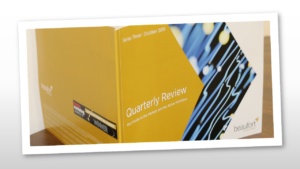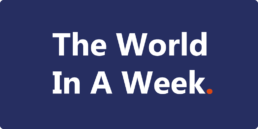Rate rise 'back on the table' as inflation hits 10-year high
Our Chief Executive, Derrick Dunne, comments on the 4.2% rise in inflation from October and how this may affect interest rates.
Fund selectors' top ESG picks for November
With COP26 dominating the investment agenda this month, and the Financial Conduct Authority stressing green will be in everything it does from now on, here are five asset allocators' top ESG picks for November.
The World In A Week - Shaken, Not Stirred
Bonds took centre stage last week, and it wasn’t just the premiere of ‘No Time to Die’ at the Royal Albert Hall. The interest rates on global government bonds rose on the back of increased concerns that central banks would raise borrowing costs earlier, in the face of sustained inflationary pressures from the global supply chain issues. This caused jitters in the equity markets, with the MSCI All-Country World Index down -1.4% in GBP terms (-2.2% in local currency terms).
US 10 year treasury yields rose from 1.31% the previous week and peaked at 1.54%. The sell-off in the UK gilt market was even more pronounced, with yields on the 10 year benchmark rising above 1% for the first time since the onset of the pandemic. What has been even more stark in recent weeks is the very sharp rise in UK “breakeven” inflation rates. These are interpreted as market participant's expectation of what inflation will run at, on average, over a particular period. For instance, the 5 year breakeven market was at one stage forecasting inflation of 4% over the same period. The market is currently heavily impacted by the inflation hedging activities of pension funds, which diminishes its predictive ability, but it is a measure of just how much anxiety about the global fuel shortage is troubling markets.
While panic-buying has made the energy shortage particularly acute in the UK, the effects are very much reverberating globally. Power plants using natural gas were very efficient as stop-gaps for renewable energy sources when there was no wind or sun. A decade of underinvestment in traditional energy sources, in favour of renewables, has made the system more fragile and liable to supply shocks. This has caused the global liquefied natural gas price to round trip from a record low to a record high in less than a year. While we think these bottlenecks will get resolved, they may keep inflation higher for longer than central banks had expected. We would also anticipate this to be relatively accretive to the positions in our portfolios that benefit from higher inflation and interest rates. In the face of the media headlines, challenges, and opportunities posed, it is important that investors keep the same poise and composure of 007, shaken not stirred.
Any opinions stated are honestly held but are not guaranteed and should not be relied upon.
The information contained in this document is not to be regarded as an offer to buy or sell, or the solicitation of any offer to buy or sell, any investments or products.
The content of this document is for information only. It is advisable that you discuss your personal financial circumstances with a financial adviser before undertaking any investments.
All the data contained in the communication is believed to be reliable but may be inaccurate or incomplete. Unless otherwise specified all information is produced as of 4th October 2021.
© 2021 YOU Asset Management. All rights reserved.
The World In A Week - Bridging the Gap
At the start of last week, we saw an initial rise in the number of coronavirus cases. However, since then there has been a sustained drop in the level of UK cases with the latest number of positive cases for COVID-19 falling for five days in a row. The seven-day average number of cases versus the week before showed a 15.4% decline, with the daily death count remaining very low compared to previous highs seen in January 2021. This is likely attributed to the fact that as of Friday, 88% of individuals over the age of 18 have now received the first dose with 70% of individuals now having had both doses of the jab.
Equity markets sold off sharply last Monday, which saw the FTSE All Share Index fall -2.3% in a day following negative market sentiment around the Delta coronavirus variant. Nevertheless, the FTSE All Share Index closed at +0.6% for the week following a strong rebound. US stocks closed at record highs with the S&P 500 up +2.3% and the NASDAQ up +3.1% in Sterling terms.
Elsewhere in the US, the wealth inequality gap has widened to record levels where the ultra-rich have seen their net worth skyrocket, underpinned by a booming stock market. The Federal Reserve Chair Jay Powell stated that this is a difficult issue to fix, since residential property and stocks typically appreciate during periods of business expansion. The significant fiscal stimulus that we have seen deployed in the US via stimulus cheques has supported lower income families who would have otherwise been financially impacted. There are clearly numerous structural factors at play that are causing the gap to increase and, without reform, we can expect this trend to continue.
Any opinions stated are honestly held but are not guaranteed and should not be relied upon.
The information contained in this document is not to be regarded as an offer to buy or sell, or the solicitation of any offer to buy or sell, any investments or products.
The content of this document is for information only. It is advisable that you discuss your personal financial circumstances with a financial adviser before undertaking any investments.
All the data contained in the communication is believed to be reliable but may be inaccurate or incomplete. Unless otherwise specified all information is produced as of 26th July 2021.
© 2021 YOU Asset Management. All rights reserved.
The World In A Week - It’s the Hope that Kills You!
Last week was a tough week for equity markets, the S&P 500 Index in the US fell -1.9% while the FTSE 100 in the UK fell -1.6%. All of this stemmed from a change of tone from the Federal Reserve, with Chairman Jerome Powell coming out with a statement which was far more hawkish than the market anticipated. Stating that inflationary fears may require an increase in interest rates far sooner than had previously been indicated sent markets into a downward spiral. In the currency markets this had the unsurprising effect of driving the dollar higher, and sterling retraced over -2%.
However, other reactions in the market might not seem so intuitive. Within the bond market, looking at the yield on the US 10 Year treasuries, they contracted from around the 1.6% to 1.4% level. The bond market telling us that it does not believe that inflation will be a problem, or that what we are experiencing is transitory as we move out of the COVID-19 crisis.
Within equity markets there did not appear to be outright selling taking place, (according to analysis conducted by Morgan Stanley), but rather more sectorial and style rotation. Over the week growth and technology outperformed cyclicals. One explanation for this is that a Fed with a tightening bias – as the rate of change in economic growth decelerates – results in an environment in which the yield curve flattens, the dollar strengthens, and the equity risk outlook is mixed, leading to the market looking for companies with more growth characteristics. It remains to be seen whether this holds true.
On the virus front there was some bad news in the UK. The week saw the most coronavirus cases since February, with over 11,000 new cases reported affecting all age groups. This is the Indian or Delta variant, which appears to be far more infectious and twice as likely to send victims to hospital relative to the Alpha variant. This latest mutation has spread to South America, while COVID-19 continues to kill thousands daily on a global basis. Therefore, the need to vaccinate globally remains a top priority.
Finally, I feel it would be remiss not to mention the England vs Scotland European Championship game. It was the first time in 25 years that the two countries had met in a major competition. England on home turf were the hot favourites, it was going to be a walk in the park accordingly but clearly Scotland had not read the script. The match, if you do not know, ended in a 0-0 draw. No disaster but as usual, against all the hype and expectation, England failed to deliver. As is often said… it’s the hope that kills you!
Any opinions stated are honestly held but are not guaranteed and should not be relied upon.
The information contained in this document is not to be regarded as an offer to buy or sell, or the solicitation of any offer to buy or sell, any investments or products.
The content of this document is for information only. It is advisable that you discuss your personal financial circumstances with a financial adviser before undertaking any investments.
All the data contained in the communication is believed to be reliable but may be inaccurate or incomplete. Unless otherwise specified all information is produced as of 21st June 2021.
© 2021 Beaufort Investment. All rights reserved.
The World In A Week - Fishing For A Solution
We have had Brexit looming in the background, with its 11 month countdown, since we officially left the European Union on 31st January 2020. Will we see a deal brokered at the 11th hour? The most recent sticking point does seem to focus on EU fishing rights in UK waters, but this illustrates the difficulty in solving disagreements over fair competition rules and the UK demonstrating it has regained its sovereignty.
It is inevitable that Sterling will take the brunt of the short-term uncertainty, until we know which side of the knife edge the deal will fall. Fractured politics continues across the pond with renewed interest in the next fiscal stimulus package for the US. The much speculated $3 trillion economic stimulus package, that would have likely arrived if the Democrats ‘blue wave’ had landed, has been diluted to a very precise $908 billion deal. The compromise seems to be focused on stabilising the US economy, rather than stimulating it, with an increase in the unemployment benefits. It is hoped that this will reduce fear amongst those in work and perhaps encourage an increase in spending.
The difficulty in getting this deal across the line is having Congress agree, and whether President Trump will sign. His current tweets suggest he is being less than helpful in his last weeks in charge, threatening to veto the current defence bill being discussed.
Back to the UK where a quick decision was made, which has seen the UK become the first country to approve a COVID-19 vaccine. The Pfizer and BioNTech vaccine will be available for inoculations this week, after approval from the Medicines and Healthcare products Regulatory Agency.
Whilst this is undoubtedly good news, the bulk of vaccinations for at-risk individuals will take place next year. The original 30 million doses ordered in July has been increased by an additional order of 10 million, of which 800,000 should arrive in the UK this week.
Any opinions stated are honestly held but are not guaranteed and should not be relied upon.
The information contained in this document is not to be regarded as an offer to buy or sell, or the solicitation of any offer to buy or sell, any investments or products.
The content of this document is for information only. It is advisable that you discuss your personal financial circumstances with a financial adviser before undertaking any investments.
All the data contained in the communication is believed to be reliable but may be inaccurate or incomplete. Unless otherwise specified all information is produced as of 07th December 2020.
The World In A Week - Summer Lull
Equity markets were buoyant last week, led by the US which hit yet another new high returning to pre-crisis levels; the only exception was the FTSE All-Share which continues to struggle and remains in negative territory at Friday’s close and year to date.
Inflation data in the US and Europe accelerated in July. In the US, auto and apparel costs pushed data up by 0.6% from the previous month, double economists’ estimates of 0.3% and a 4-month high of 1.6% on an annualised basis. In Europe, the move was not so marked, moving from 0.3% in June to 0.4% in July, driven by non-energy industrial goods and services, food, alcohol and tobacco. This tick up can be attributed to a rebound in demand, from the depths of the pandemic-induced lockdowns earlier this year and suggests that inflation is closer than thought to returning to the pre-crisis pace.
PMI data in Europe for July showed a sharp decline from 54.2 to 51, as tougher pandemic restrictions and the UK’s decision to increase the number of countries which require mandatory quarantine on returning to the UK came into force across Europe. Most indicators remained in expansionary territory, although services were hit particularly hard. In addition to Eurozone data, country-level data for France and Germany was also released and showed a fall from 52.4 to 49 and 57.3 to 51.9, respectively.
Despite bourses trending higher, the recovery appears to be slowing, although hopes for a vaccine have provided periodic support.
Any opinions stated are honestly held but are not guaranteed and should not be relied upon.
The information contained in this document is not to be regarded as an offer to buy or sell, or the solicitation of any offer to buy or sell, any investments or products.
The content of this document is for information only. It is advisable that you discuss your personal financial circumstances with a financial adviser before undertaking any investments.
All the data contained in the communication is believed to be reliable but may be inaccurate or incomplete. Unless otherwise specified all information is produced as of 24th August 2020.
15 Years Client-Focused Communications
Our communications are client-focused and we speak plain English:
-
Proud of our positive client feedback
-
Our materials add value to financial advisors - and to their clients!
-
Regular meetings and seminars with the Investment team
Our quarterly reporting has evolved from a 3-page report in October 2005 to a 32-page booklet today.
Today's Quarterly Review - a 32-page booklet

You can view all our literature including Quarterly Reviews, Factsheets, Client Guides and Brochures here
For further information, please get in touch with Tony Hicks: 07867 398388 or email us at marketing@beaufortinvestment.co.uk
The World In A Week - Santa Claus, Here We Come...
Last week the sole focus for UK citizens and investors was the UK election. The Conservatives sealed a landslide victory, their largest in decades, which saw the Pound jump and the UK equity market rally; smaller and mid-sized companies were notable beneficiaries. In what has felt like an age of political stalemate, Boris will now have 100 days to deliver his budget; tax breaks for workers via a change in National Insurance have been promised and are expected to be confirmed in the first budget. The relationship the UK will have with Europe, however, is still unclear.
It was also a good week for US equity markets, which closed on a strong note following the announcement that President Trump would agree to a limited, dubbed Phase 1, trade deal with China, which would mean a hold on new tariffs that were due to take effect on 15th December. Most sectors rallied, the S&P 500 returned more than 0.5% while the Nasdaq edged up in excess of 0.75%.
As always, there is still much more information required around Brexit and the US-China trade negotiations, but markets typically like certainty and were generally more buoyant last week; with broad felt optimism we wish for a sustained Santa Claus rally.
It has been a great year for Beaufort Investment; we broke through £1bn in assets under management, we were the recipient of the coveted Money Marketing Best Discretionary Manager Award and our Active Model Portfolio service reached it’s 15-year anniversary. In terms of performance, our Model Portfolios performed well, despite a difficult global geopolitical backdrop.
We would like to take this opportunity to thank our clients for their ongoing support of the Model Portfolios and the recently launched funds and wish you a happy festive period.
We will be taking a break from penning The World In A Week and will return on 6th January 2020.







The World In A Week - Beware Greeks Bearing Letters
Written by Cormac Nevin.
Last week markets had a placid start, until Friday, when fears about the discovery of what was dubbed the “Omicron variant” of COVID-19 descended upon markets like a flock of thanksgiving turkeys. The MSCI All Country World Index of global equities dropped -2.4% in GBP terms on Friday, to end the week down -1.9%. Global Bonds, as measured by the Blomberg Global Aggregate Index, were up +0.1% GBP Hedged.
Omicron is the 15th letter of the Greek alphabet and, in a delicious irony, the sharp market selloff on Friday was exacerbated by the third letter of the Greek alphabet; Gamma. This is used to describe the phenomenon resulting from the widespread use of options to make highly leveraged bets on single stock names, particularly by retail traders on platforms like Robinhood. This causes a feedback loop whereby selling begets more selling by dealers and can result in sharp plunges like that which we have witnessed. The US Equity market is currently dominated by this activity, which explains much of the parabolic upside moves in names like Tesla and gives us slight cause for concern about having too much exposure to US Equities.
Events such as last Friday reinforce our conviction in our neutral equity positioning and diversified approach. MSCI Japan was down only -0.2% on Friday, as European and US markets sank – illustrating the opportunities various markets provide. While it is likely too early to say for sure, the Omicron selloff appears to be reversing. Countries are much better equipped to deal with new variants of COVID-19 than they were in the first wave, illustrated by the UK’s quick closure of travel from Southern Africa. In addition, companies like Moderna are already using their mRNA technology to synthesise Omicron-specific vaccines.
Given stretched valuations and the implicit leverage in certain markets, we think events like Friday may become more frequent. It will also likely be even more challenging for markets once central banks stop providing liquidity to an arguably overheating economy. A flexible and diversified approach will remain critical.
Any opinions stated are honestly held but are not guaranteed and should not be relied upon.
The information contained in this document is not to be regarded as an offer to buy or sell, or the solicitation of any offer to buy or sell, any investments or products.
The content of this document is for information only. It is advisable that you discuss your personal financial circumstances with a financial adviser before undertaking any investments.
All the data contained in the communication is believed to be reliable but may be inaccurate or incomplete. Unless otherwise specified all information is produced as of 29th November 2021.
© 2021 YOU Asset Management. All rights reserved.